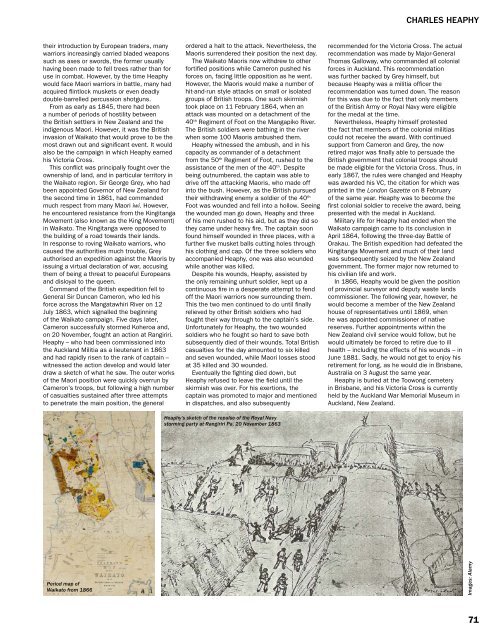Create successful ePaper yourself
Turn your PDF publications into a flip-book with our unique Google optimized e-Paper software.
CHARLES HEAPHY<br />
their introduction by European traders, many<br />
warriors increasingly carried bladed weapons<br />
such as axes or swords, the former usually<br />
having been made to fell trees rather than for<br />
use in combat. However, by the time Heaphy<br />
would face Maori warriors in battle, many had<br />
acquired flintlock muskets or even deadly<br />
double-barrelled percussion shotguns.<br />
From as early as 1845, there had been<br />
a number <strong>of</strong> periods <strong>of</strong> hostility between<br />
the British settlers in New Zealand and the<br />
indigenous Maori. However, it was the British<br />
invasion <strong>of</strong> Waikato that would prove to be the<br />
most drawn out and significant event. It would<br />
also be the campaign in which Heaphy earned<br />
his Victoria Cross.<br />
This conflict was principally fought over the<br />
ownership <strong>of</strong> land, and in particular territory in<br />
the Waikato region. Sir George Grey, who had<br />
been appointed Governor <strong>of</strong> New Zealand for<br />
the second time in 1861, had commanded<br />
much respect from many Maori iwi. However,<br />
he encountered resistance from the Kingitanga<br />
Movement (also known as the King Movement)<br />
in Waikato. The Kingitanga were opposed to<br />
the building <strong>of</strong> a road towards their lands.<br />
In response to roving Waikato warriors, who<br />
caused the authorities much trouble, Grey<br />
authorised an expedition against the Maoris by<br />
issuing a virtual declaration <strong>of</strong> war, accusing<br />
them <strong>of</strong> being a threat to peaceful Europeans<br />
and disloyal to the queen.<br />
Command <strong>of</strong> the British expedition fell to<br />
General Sir Duncan Cameron, who led his<br />
force across the Mangatawhiri River on 12<br />
July 1863, which signalled the beginning<br />
<strong>of</strong> the Waikato campaign. Five days later,<br />
Cameron successfully stormed Koheroa and,<br />
on 20 November, fought an action at Rangiriri.<br />
Heaphy – who had been commissioned into<br />
the Auckland Militia as a lieutenant in 1863<br />
and had rapidly risen to the rank <strong>of</strong> captain –<br />
witnessed the action develop and would later<br />
draw a sketch <strong>of</strong> what he saw. The outer works<br />
<strong>of</strong> the Maori position were quickly overrun by<br />
Cameron’s troops, but following a high number<br />
<strong>of</strong> casualties sustained after three attempts<br />
to penetrate the main position, the general<br />
ordered a halt to the attack. Nevertheless, the<br />
Maoris surrendered their position the next day.<br />
The Waikato Maoris now withdrew to other<br />
fortified positions while Cameron pushed his<br />
forces on, facing little opposition as he went.<br />
However, the Maoris would make a number <strong>of</strong><br />
hit-and-run style attacks on small or isolated<br />
groups <strong>of</strong> British troops. One such skirmish<br />
took place on 11 February 1864, when an<br />
attack was mounted on a detachment <strong>of</strong> the<br />
40 th Regiment <strong>of</strong> Foot on the Mangapiko River.<br />
The British soldiers were bathing in the river<br />
when some 100 Maoris ambushed them.<br />
Heaphy witnessed the ambush, and in his<br />
capacity as commander <strong>of</strong> a detachment<br />
from the 50 th Regiment <strong>of</strong> Foot, rushed to the<br />
assistance <strong>of</strong> the men <strong>of</strong> the 40 th . Despite<br />
being outnumbered, the captain was able to<br />
drive <strong>of</strong>f the attacking Maoris, who made <strong>of</strong>f<br />
into the bush. However, as the British pursued<br />
their withdrawing enemy a soldier <strong>of</strong> the 40 th<br />
Foot was wounded and fell into a hollow. Seeing<br />
the wounded man go down, Heaphy and three<br />
<strong>of</strong> his men rushed to his aid, but as they did so<br />
they came under heavy fire. The captain soon<br />
found himself wounded in three places, with a<br />
further five musket balls cutting holes through<br />
his clothing and cap. Of the three soldiers who<br />
accompanied Heaphy, one was also wounded<br />
while another was killed.<br />
Despite his wounds, Heaphy, assisted by<br />
the only remaining unhurt soldier, kept up a<br />
continuous fire in a desperate attempt to fend<br />
<strong>of</strong>f the Maori warriors now surrounding them.<br />
This the two men continued to do until finally<br />
relieved by other British soldiers who had<br />
fought their way through to the captain’s side.<br />
Unfortunately for Heaphy, the two wounded<br />
soldiers who he fought so hard to save both<br />
subsequently died <strong>of</strong> their wounds. Total British<br />
casualties for the day amounted to six killed<br />
and seven wounded, while Maori losses stood<br />
at 35 killed and 30 wounded.<br />
Eventually the fighting died down, but<br />
Heaphy refused to leave the field until the<br />
skirmish was over. For his exertions, the<br />
captain was promoted to major and mentioned<br />
in dispatches, and also subsequently<br />
recommended for the Victoria Cross. The actual<br />
recommendation was made by Major-General<br />
Thomas Galloway, who commanded all colonial<br />
forces in Auckland. This recommendation<br />
was further backed by Grey himself, but<br />
because Heaphy was a militia <strong>of</strong>ficer the<br />
recommendation was turned down. The reason<br />
for this was due to the fact that only members<br />
<strong>of</strong> the British Army or Royal Navy were eligible<br />
for the medal at the time.<br />
Nevertheless, Heaphy himself protested<br />
the fact that members <strong>of</strong> the colonial militias<br />
could not receive the award. With continued<br />
support from Cameron and Grey, the now<br />
retired major was finally able to persuade the<br />
British government that colonial troops should<br />
be made eligible for the Victoria Cross. Thus, in<br />
early 1867, the rules were changed and Heaphy<br />
was awarded his VC, the citation for which was<br />
printed in the London Gazette on 8 February<br />
<strong>of</strong> the same year. Heaphy was to become the<br />
first colonial soldier to receive the award, being<br />
presented with the medal in Auckland.<br />
Military life for Heaphy had ended when the<br />
Waikato campaign came to its conclusion in<br />
April 1864, following the three-day Battle <strong>of</strong><br />
Orakau. The British expedition had defeated the<br />
Kingitanga Movement and much <strong>of</strong> their land<br />
was subsequently seized by the New Zealand<br />
government. The former major now returned to<br />
his civilian life and work.<br />
In 1866, Heaphy would be given the position<br />
<strong>of</strong> provincial surveyor and deputy waste lands<br />
commissioner. The following year, however, he<br />
would become a member <strong>of</strong> the New Zealand<br />
house <strong>of</strong> representatives until 1869, when<br />
he was appointed commissioner <strong>of</strong> native<br />
reserves. Further appointments within the<br />
New Zealand civil service would follow, but he<br />
would ultimately be forced to retire due to ill<br />
health – including the effects <strong>of</strong> his wounds – in<br />
June 1881. Sadly, he would not get to enjoy his<br />
retirement for long, as he would die in Brisbane,<br />
Australia on 3 August the same year.<br />
Heaphy is buried at the Toowong cemetery<br />
in Brisbane, and his Victoria Cross is currently<br />
held by the Auckland <strong>War</strong> Memorial Museum in<br />
Auckland, New Zealand.<br />
Heaphy’s sketch <strong>of</strong> the repulse <strong>of</strong> the Royal Navy<br />
storming party at Rangiriri Pa, 20 November 1863<br />
Period map <strong>of</strong><br />
Waikato from 1866<br />
Images: Alamy<br />
71


















